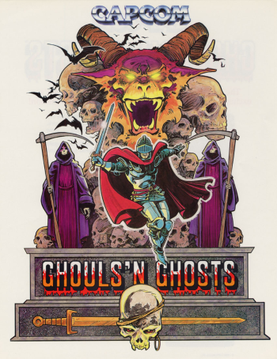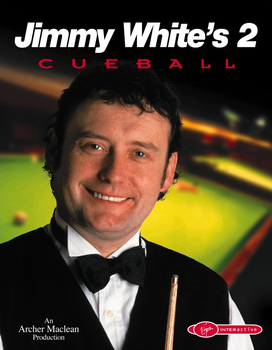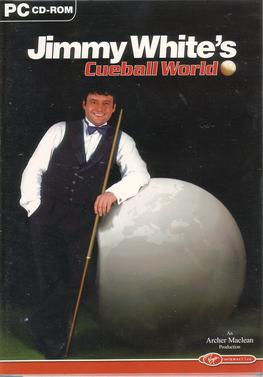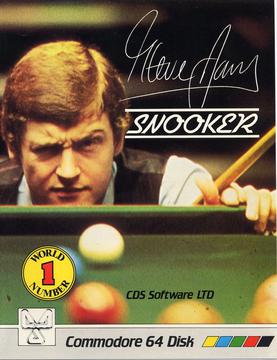
Ghouls 'n Ghosts, known as Dai Makaimura in Japan, is a side-scrolling platform game developed by Capcom, released as an arcade video game in 1988 and ported to home platforms. It is the sequel to Ghosts 'n Goblins and the second game in the Ghosts 'n Goblins series.

Columns is a match-three puzzle video game released by Jay Geertsen in 1989. Designed for the 68000-based HP 9000 running HP-UX, it was ported to Mac and DOS before being released commercially by Sega who ported it to arcades and then to several Sega consoles. The game was subsequently ported to other home computer platforms, including the Atari ST.

James Warren White is an English professional snooker player who has won four seniors World titles. Nicknamed "The Whirlwind" because of his fluid, swift and attacking style of play, White is the 1980 World Amateur Champion, 2009 Six-red World champion, a record four-time World Seniors Champion, 2019 Seniors 6-Red World Champion and 1984 World Doubles champion with Alex Higgins.

Altered Beast is a 1988 beat 'em up arcade video game developed and published by Sega. The game is set in Ancient Greece and follows a player character chosen by Zeus to rescue his daughter Athena from the demonic ruler of the underworld, Neff. Through the use of power-ups, the player character can assume the form of different magical beasts. It was ported to several home video game consoles and home computers. It was the pack-in game for the Mega Drive when that system launched in 1988.

Sensible Soccer, often called Sensi, is an association football video game series which was popular in the early 1990s and which still retains a following. It was developed by Sensible Software and first released for Amiga and Atari ST computers in 1992 as well as for the IBM PC compatibles. The series was created by Jon Hare and Chris Yates, as a successor to their previous football game MicroProse Soccer (1988), which in turn was inspired by the arcade video game Tehkan World Cup (1985).

Avalon Interactive Group, Ltd. was a British video game distributor based within Europe that formerly traded as the video game publishing and distributing division of British conglomerate the Virgin Group.

Shining in the Darkness, released as Shining and the Darkness in Japan, is a 1991 role-playing video game for the Mega Drive/Genesis video game console. It was one of the first role-playing games released for the system, and was the first in the Shining series.

Golden Axe is a side-scrolling hack-and-slash video game released by Sega for arcades in 1989, running on the Sega System 16B arcade hardware. Makoto Uchida was the lead designer of the game, and was also responsible for the creation of the previous year's Altered Beast. The game casts players as one of three warriors who must free the fantastical land of Yuria from the tyrannical rule of Death Adder, who wields the titular Golden Axe.

Fantastic Dizzy is a 1991 video game developed by Codemasters. It is part of the Dizzy series. It was published on several platforms, including Mega Drive/Genesis, Master System, Game Gear, Nintendo Entertainment System, Amiga, and MS-DOS.

Silpheed is a video game developed by Game Arts and designed by Takeshi Miyaji. It made its debut on the Japanese PC-8801 in 1986, and was ported to the Fujitsu FM-7 and DOS formats soon after. It was later remade for the Sega CD and has a sequel called Silpheed: The Lost Planet for the PlayStation 2.

Bonanza Bros. is a 3D-style, 2D side-scrolling stealth action game developed and released by Sega in 1990. It is one of the earliest arcade games powered by the Sega System 24 arcade system board. It was ported to various home systems, including the Mega Drive/Genesis, Master System, PC-Engine/TurboGrafx-CD, and several home computers.
Archer Maclean was a British video game programmer. He was the author of Dropzone which he developed for the Atari 8-bit computers and was ported to other systems. Maclean also developed the Commodore 64 version of International Karate and the sequel, IK+ which was developed for the Commodore 64 and ported to other systems. He was also known for his series of snooker and pool games, which commenced with Jimmy White's Whirlwind Snooker in 1991.

Castle of Illusion Starring Mickey Mouse is a 1990 platform game developed and published by Sega and released for the Mega Drive/Genesis. An 8-bit version of the game was later released for the Master System and Game Gear. The game follows Mickey Mouse on a quest to save Minnie Mouse from the evil witch Mizrabel. The clone of this game has ever been in a Mega Man clone. It is the first game in Sega's Illusion video game series starring Mickey.

Jimmy White's 2: Cueball is a snooker and pool video game developed by Awesome Developments and published by Virgin Interactive as a sequel to Jimmy White's 'Whirlwind' Snooker. It was originally released in 1999 for Windows and Dreamcast. A PlayStation version was released in 2000 in Europe and North America, with Bay Area Multimedia handling distribution for the latter territory. Archer Maclean, the designer of the original game, led the development team. The game includes mini-games connected with a pub setting. A Game Boy Color version of the game was released in 2000. A sequel to Cueball, called Jimmy White's Cueball World, was released in Europe for the PC in 2001. The game received mixed reviews from critics, with the PC and Dreamcast versions faring better than the PlayStation port.

World Snooker Championship 2007 is a sports video game developed by Blade Interactive and published by Sega for PlayStation 2, PlayStation Portable, Xbox 360 and PlayStation 3.

Illusion, known in Japan as I Love Mickey Mouse, is a series of platforming video games developed and published by Sega for its consoles Master System, Sega Genesis and Game Gear. The series follows the adventures of Disney's cartoon character Mickey Mouse between various fantasy worlds. The series includes Castle of Illusion, and its sequels Land of Illusion, World of Illusion and Legend of Illusion.
The World Snooker Championship (WSC) is a series of video games based on snooker featuring licensing from the World Professional Billiards and Snooker Association. The first game in the series was released in 2001 and the last in 2011; a new licensed World Snooker game, Snooker 19, was released in 2019. The first four games were published by Codemasters and developed by Blade Interactive Software. Later games were published by Sega, Deep Silver and Koch Media.

Archer Maclean's Pool is a video game designed and produced by Archer Maclean, published by Virgin Games in 1992 for Amiga, Atari ST and MS-DOS.

Jimmy White's Cueball World is a sports simulation video game published by Virgin Interactive as the sequel to Jimmy White's 2: Cueball, itself a sequel to Jimmy White's 'Whirlwind' Snooker. The development team once again being led by Archer Maclean, who designed the other two Jimmy White titles. The game was released in December 2001 in Europe, with a North American release was planned to be released a year later by Titus Software under a budget range using the Virgin Interactive brand name. PlayStation 2 and Xbox versions were planned, but were later cancelled.

Steve Davis Snooker is a sports simulation video game developed and published by CDS Software in 1984. The budget release published by Blue Ribbon Software reached the top of the UK charts in May 1988. Steve Davis Snooker simulates the cue sport snooker. Released under licence from 6-time Snooker World Champion, Steve Davis.



















